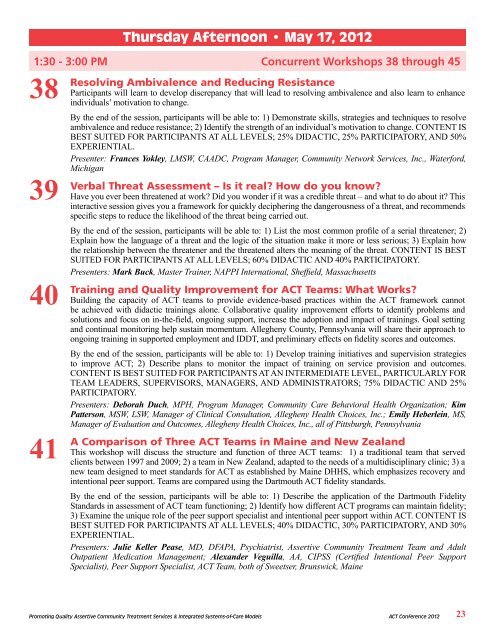2012 ACT Conference Brochure Online - Assertive Community ...
2012 ACT Conference Brochure Online - Assertive Community ...
2012 ACT Conference Brochure Online - Assertive Community ...
You also want an ePaper? Increase the reach of your titles
YUMPU automatically turns print PDFs into web optimized ePapers that Google loves.
38<br />
39<br />
40<br />
41<br />
Thursday Afternoon • May 17, <strong>2012</strong><br />
1:30 - 3:00 PM Concurrent Workshops 38 through 45<br />
Resolving Ambivalence and Reducing Resistance<br />
Participants will learn to develop discrepancy that will lead to resolving ambivalence and also learn to enhance<br />
individuals’ motivation to change.<br />
By the end of the session, participants will be able to: 1) Demonstrate skills, strategies and techniques to resolve<br />
ambivalence and reduce resistance; 2) Identify the strength of an individual’s motivation to change. CONTENT IS<br />
BEST SUITED FOR PARTICIPANTS AT ALL LEVELS; 25% DID<strong>ACT</strong>IC, 25% PARTICIPATORY, AND 50%<br />
EXPERIENTIAL.<br />
Presenter: Frances Yokley, LMSW, CAADC, Program Manager, <strong>Community</strong> Network Services, Inc., Waterford,<br />
Michigan<br />
Verbal Threat Assessment – Is it real? How do you know?<br />
Have you ever been threatened at work? Did you wonder if it was a credible threat – and what to do about it? This<br />
interactive session gives you a framework for quickly deciphering the dangerousness of a threat, and recommends<br />
specific steps to reduce the likelihood of the threat being carried out.<br />
By the end of the session, participants will be able to: 1) List the most common profile of a serial threatener; 2)<br />
Explain how the language of a threat and the logic of the situation make it more or less serious; 3) Explain how<br />
the relationship between the threatener and the threatened alters the meaning of the threat. CONTENT IS BEST<br />
SUITED FOR PARTICIPANTS AT ALL LEVELS; 60% DID<strong>ACT</strong>IC AND 40% PARTICIPATORY.<br />
Presenters: Mark Buck, Master Trainer, NAPPI International, Sheffield, Massachusetts<br />
Training and Quality Improvement for <strong>ACT</strong> Teams: What Works?<br />
Building the capacity of <strong>ACT</strong> teams to provide evidence-based practices within the <strong>ACT</strong> framework cannot<br />
be achieved with didactic trainings alone. Collaborative quality improvement efforts to identify problems and<br />
solutions and focus on in-the-field, ongoing support, increase the adoption and impact of trainings. Goal setting<br />
and continual monitoring help sustain momentum. Allegheny County, Pennsylvania will share their approach to<br />
ongoing training in supported employment and IDDT, and preliminary effects on fidelity scores and outcomes.<br />
By the end of the session, participants will be able to: 1) Develop training initiatives and supervision strategies<br />
to improve <strong>ACT</strong>; 2) Describe plans to monitor the impact of training on service provision and outcomes.<br />
CONTENT IS BEST SUITED FOR PARTICIPANTS AT AN INTERMEDIATE LEVEL, PARTICULARLY FOR<br />
TEAM LEADERS, SUPERVISORS, MANAGERS, AND ADMINISTRATORS; 75% DID<strong>ACT</strong>IC AND 25%<br />
PARTICIPATORY.<br />
Presenters: Deborah Duch, MPH, Program Manager, <strong>Community</strong> Care Behavioral Health Organization; Kim<br />
Patterson, MSW, LSW, Manager of Clinical Consultation, Allegheny Health Choices, Inc.; Emily Heberlein, MS,<br />
Manager of Evaluation and Outcomes, Allegheny Health Choices, Inc., all of Pittsburgh, Pennsylvania<br />
A Comparison of Three <strong>ACT</strong> Teams in Maine and New Zealand<br />
This workshop will discuss the structure and function of three <strong>ACT</strong> teams: 1) a traditional team that served<br />
clients between 1997 and 2009; 2) a team in New Zealand, adapted to the needs of a multidisciplinary clinic; 3) a<br />
new team designed to meet standards for <strong>ACT</strong> as established by Maine DHHS, which emphasizes recovery and<br />
intentional peer support. Teams are compared using the Dartmouth <strong>ACT</strong> fidelity standards.<br />
By the end of the session, participants will be able to: 1) Describe the application of the Dartmouth Fidelity<br />
Standards in assessment of <strong>ACT</strong> team functioning; 2) Identify how different <strong>ACT</strong> programs can maintain fidelity;<br />
3) Examine the unique role of the peer support specialist and intentional peer support within <strong>ACT</strong>. CONTENT IS<br />
BEST SUITED FOR PARTICIPANTS AT ALL LEVELS; 40% DID<strong>ACT</strong>IC, 30% PARTICIPATORY, AND 30%<br />
EXPERIENTIAL.<br />
Presenters: Julie Keller Pease, MD, DFAPA, Psychiatrist, <strong>Assertive</strong> <strong>Community</strong> Treatment Team and Adult<br />
Outpatient Medication Management; Alexander Veguilla, AA, CIPSS (Certified Intentional Peer Support<br />
Specialist), Peer Support Specialist, <strong>ACT</strong> Team, both of Sweetser, Brunswick, Maine<br />
Promoting Quality <strong>Assertive</strong> <strong>Community</strong> Treatment Services & Integrated Systems-of-Care Models <strong>ACT</strong> <strong>Conference</strong> <strong>2012</strong><br />
23




